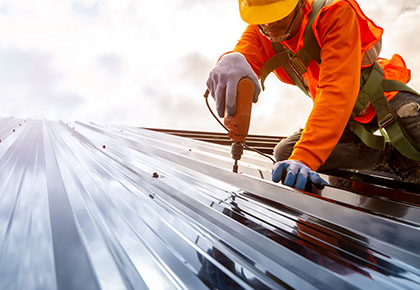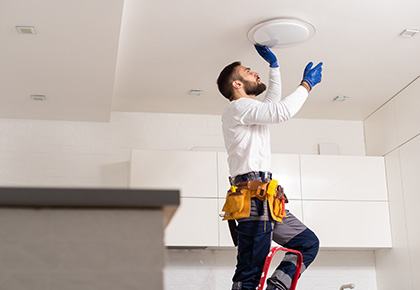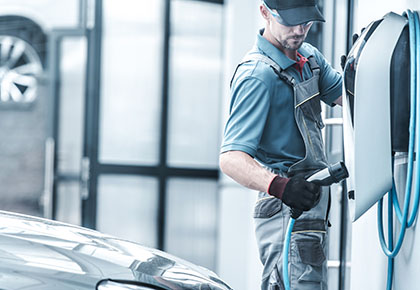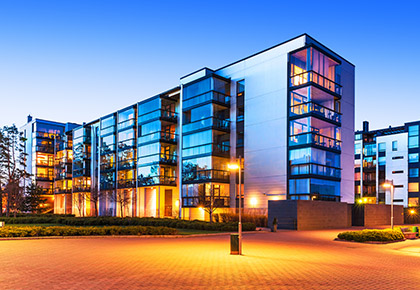-
Three tips for buying in bulk savings
As consumers, we’re familiar with saving money by purchasing products like food and household goods in bulk. But, can this same savings model be applied to the purchases and operational costs of a homeowner association (HOA), condominium or community association? -

What is an HOA master insurance policy?
We know that in the same way we protect ourselves, our assets also carry this significance. That is why HOA master insurance policies are essential for your community, as this type of coverage can help you protect more than just your physical assets. -
Incentives Aim to Green Up New York, Reduce Operating Costs for Building Owners
A recent study found that 75% of greenhouse gasses in New York City are generated by buildings, primarily multifamily residential buildings. As part of a city-wide effort to incentivize buildings to develop programs to curb emissions, FirstService Residential held its Third Annual Green Expo & Symposium on May 15 in New York. The event featured a panel of industry experts, including FirstService Residential President Dan Wurtzel, who described the benefits of participating in city programs, as well as the opportunities to save money, help the environment and enhance property values. -
How to increase HOA and community volunteerism
Regardless of the size of your community, or where it’s located, there is always one thing that every community association board and committee needs: resident volunteers. Unfortunately, however, volunteers are often a scarce resource. -
HOA Pools: The basics of swimming pool insurance
Swimming pools are one of the most common, and most desirable, amenities in communities. Making sure to have proper community pool insurance coverage. -
Keeping HOA and Condo Common Areas Clean During the Coronavirus Pandemic
During these unprecedented times, residents are spending the majority of their time at home to prevent the spread of COVID-19 and protect themselves and their loved ones from infection. One of their primary contact points with the outside world is in your HOA or condo common areas, where they can be at risk of contact with lingering coronavirus or even spread existing virus to other areas of the property. Read on for a comprehensive list of places to clean and how to clean them. -
-

Capital improvements vs repairs and maintenance: What’s the difference?
Maintaining your buildings’ assets is not a one-size-fits-all proposition. The common areas require a broad range of routine maintenance and repairs to keep them looking good and operating smoothly. -
Tips for community waste management in your association
With a growing focus on proper environmental stewardship, many associations are working toward implementing green initiatives. But getting there can be daunting. With so many programs and opportunities available for all of us to reduce, re-use and recycle, it’s hard to know where to begin. -
9 tips about board of directors conflicts of interest
It’s a term that gets tossed around quite a lot. But “conflict of interest” is a real and genuine threat to your association and its proper stewardship. Understanding what the term means – as well as how to recognize and avoid conflicts of interest– can go a long way toward ensuring the strength and stability of your community and eliminating many concerns. -
FirstService Residential Executive Discusses Offbeat Second Home Investment Locations and Trends
While exclusive communities like the Hamptons or Malibu will always be attractive locations for affluent vacation home buyers, several new trends are emerging in the growing second home market. -
Put an Energy Saving Program Together for a Multifamily Property
Many HOAs and community associations would like to save energy and energy spending, but they think that putting an energy management plan into place for their multifamily property is difficult to accomplish. FS Energy's Chris Normandeau explains some basic, easy-to-do steps that can make a real impact on an association's energy usage and budget. -
Hiring a reserve study company: Five things to know
In our guide to capital improvements , reserve studies and their relationship to capital improvements and preventive maintenance were discussed at length. -
Seven tips to finding a reserve study company
Your reserve fund is what helps your association anticipate its future– and budget for it, too. This fund gives you the power to maintain the quality of your community by allowing for projects that are both necessary and expensive (like a future roofing or paving project, for instance). -

5 energy conservation strategies for community associations
In this article, we delve into the significance of energy conservation within community associations, exploring its benefits and strategies for effective implementation. -
Energy efficiency tips for winter
So what can condo boards or community associations do to mitigate or even reduce costs this winter? Let’s start with what you can do in the summer and fall, before winter actually begins. This includes cleaning, tuning and performing any necessary repairs to heating systems, furnaces and boilers to make sure they won’t be working longer, harder or less efficiently than they should. Other pre-winter tasks include cleaning gutters to remove leaves and debris to ensure water can flow freely. Otherwise, water can become trapped and freeze, which can not only damage your property’s gutters, but also cause ice dams and possible roof leaks. -

What to know about condo EV charging
If your high-rise condo is ready to start looking into electric vehicle charging stations, these steps can provide a holistic overview of the process and what you can expect. -

Can HOA fees increase? The benefits of raising HOA dues
What exactly are HOA dues, and can an HOA raise dues without notice? In this article, we’ll explain what HOA dues are, HOA fee increase limits, and five benefits of small, regular increases. -
Surprising ways to stretch your HOA's dollars
If you’re on the board of a condo, co-op, high-rise or HOA, you know that managing your community’s budget is a major priority. You’ve likely explored many ways to save money and get the best deals, while still maintaining a high level of service. -
Tips for an eco-friendly building: Sustainable high-rise living
Many multifamily properties and high-rises want to implement “green” living practices and create eco-friendly communities, but not everyone knows where nor how to get started. Here are some effective and easy tips to help you be proactive and successful in achieving your sustainability goals. Read on for a list of programs and services that can be put in place in your community at little to no cost. -
Mortgage loan tips: Preparing and applying for a mortgage
We’ve got the scoop on how to get a mortgage loan, so read on for our top six tips to increase your chances. -
How to start a recycling program in your community
Is your homeowners association considering starting a recycling program for your community? If so, bravo! Take a look at some of the benefits: conserving energy, saving water, preserving resources, reducing air pollution and saving landfill space. And did you know that in addition to helping the environment, recycling can also provide economic benefits as well? To get you started, here are some tips and considerations to help your association plan and implement a successful recycling program for your community. -

Empowering Communities: Maximizing efficiency through energy audits
Energy audits serve as a critical tool for identifying inefficiencies, pinpointing areas of improvement, and ultimately fostering a more sustainable environment within community associations. -

5 ways to reduce energy costs in your condo or coop
No matter where your high-rise building is located, rising energy costs can have a drastic impact on your community association’s budget. Implementing methods to conserve energy can help your association reduce energy costs and optimize your high-rise’s annual budget.